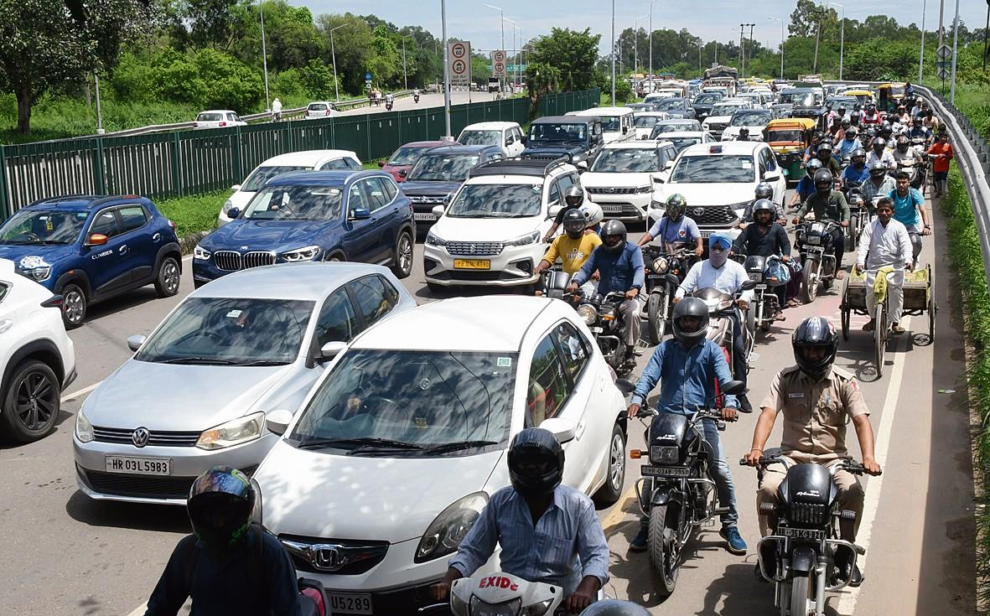In the wake of increasing pollution, it is necessary to shift to vehicles that run on electricity and the CNG. As such, the decision taken by the administration to make it necessary to purchase only battery operated two-wheelers is in the right direction.
But, at the same time, it becomes necessary to set up sufficient charging stations before stopping the registration of non-electric two-wheelers. Till sufficient charging stations are not available, the capping on registration of non-electric vehicles should be removed. Proper infrastructure is required to stop the sale of petrol two-wheelers and popularise electric vehicles among UT residents.
Impose green tax on non-electric vehicles
Capping on the registration should also be imposed on non-electric four wheelers, which cause manifold pollution. Green tax should be levied on all non -electric vehicles registered outside the tricity and the proceeds should be used to set up and operate smog towers and other pollution fighting equipment in the City Beautiful.
Consider commuters’ inconvenience
The UT Administration should reconsider capping on the registration of non-electric two-wheelers only when sufficient charging infrastructure is operational. The focus should be on setting up more charging stations to promote the use of electric vehicles. This approach would ensure a seamless transition to sustainable conveyance without inconveniencing users, which should be considered by the authorities concerned.
Balanced approach need of the hour
A balanced approach towards removing the capping on the registration of non-electric two-wheelers in Chandigarh is recommended. Gradually increase the capping while expanding charging infrastructure, provide incentives to users of electric vehicles, collaborate with private companies for a comprehensive charging network and launch public awareness campaigns to promote adoption of electric two-wheelers. This balanced approach would foster sustainable mobility without compromising convenience.
Tax rebate for buying electric vehicles
The UT Administration should reconsider its decision to cap the registration of non-electric two-wheelers as it may have a negative impact on commuters and dealers. The Administration should provide incentives and subsidies for the purchase of electric vehicles such as tax rebates, discounts and free parking. This would encourage more people to switch to green vehicles and reduce the demand for non-electric vehicles. The Administration should invest in developing the infrastructure for electric vehicles such as charging stations, battery swapping facilities and smart grids. This would make electric vehicles more popular and reliable among users and reduce the dependency on fossil fuel. Campaigns should be launched to make the public aware about benefits of electric vehicles.
A welcome step of UT administration
The restriction on the registration of non-electric two-wheelers is a welcome step. But the lack of charging stations in the city might trouble commuters. The decision cannot be taken without the proper implementation of the project. Dealers, who sell two-wheelers, should be given time to upgrade their infrastructure accordingly. The initiative to make the environment pollution free is to be taken in steps for a smooth changeover.
Why capping on two-wheelers only?
Capping on the registration of two-wheelers only is a clear cut discrimination by the UT Administration. Much more pollution is caused by four-wheel vehicles. Capping should be on the registration of cars. To reduce pollution, the Administration should improve public transport. The available local buses are inadequate for the city. The UT needs at least 5,000 local buses and a Metro with five minute service.
Admn’s decision not logical
The decision of the UT Administration to cap the registration of non-electric two-wheelers, especially when charging stations in the city are yet to be made functional is not logical. The common man would be hit hard as the cost of e-vehicles is high. Availability of spare parts for electric two-wheelers is another issue to be dealt with. Besides, livelihood of mechanics, who repair non-electric two-wheelers would be affected. Sufficient time should be given to commuters and dealers, who sell non-electric two-wheelers, to opt for e-vehicles.
UT cannot become a gas chamber
Chandigarh’s beauty has to be preserved. And for this, bold decisions are necessary. To combat pollution, the UT Administration must set up sufficient charging stations and cap the registration of non-electric vehicles. Let’s prioritise long-term benefits and prevent Chandigarh from becoming a gas chamber. Proactive steps are needed to ensure that commuters opt for electric vehicles.
A wrong approach to control pollution
The old and ill maintained vehicles, including two-wheelers and rehris fitted with old engines emit excessive pollution. No one challans or confiscates such vehicles. The pollution certificate is must for vehicles plying on city roads. New non-electric vehicles emit negligible pollution and their registration should not be stopped. The Administration has adopted wrong approach to control pollution in the City Beautiful.
Coercing people is harassment
The Administration should first make suitable arrangements for the charging of electric vehicles and exchange of batteries. Residents must have the option to buy electric or non-electric vehicles. Forcing residents to buy electric vehicles is sheer harassment by the authorities concerned.
Administration must tread with caution
The UT Administration should exercise caution before removing capping on the registration of non-electric two-wheelers. The authorities concerned should also consider the lack of stations for charging electric vehicles. A comprehensive evaluation of the infrastructure readiness, environmental impact, traffic management, public awareness, incentives and stakeholders is necessary for a balanced decision to control pollution in the UT.
Promote use of low-cost e-cycles
Capping registration of two-wheelers is not a step in the right direction keeping in view the large number of such vehicles stocked by dealers and coercing residents to buy e-vehicles. To encourage sale of e-vehicles, the UT should provide subsidies and waive off registration charges. Further, there should be enough charging stations at vulnerable points in the city. Going green is our mission. Low-cost e-cycles can also be considered as a safe mode of transport.
Admn didn’t do the homework
The UT should remove capping on the registration of non-electric two-wheelers. It seems that the authorities concerned did not do the homework before taking such a decision. The Administration should involve stakeholders and consider preference of commuters before capping registration of non-electric two-wheelers. Efforts should be made to set up enough charging stations so that people don’t face any inconvenience.
Right to buy vehicle of one’s own choice
The Administration without making proper and necessary arrangements for charging of electric two-wheelers cannot cap the registration of non-electric two-wheelers. People cannot be forced to buy electric two-wheelers. As people spend money from their own pockets, so they have the right to buy vehicles of their own choice. The Administration should give good incentives to promote the use of e-vehicles.
Implement decision in phased manner
The charging stations are yet to be made functional in the city. The Administration should ban diesel vehicles, which pollute the city. Two-wheelers do not spread much pollution. If the authorities are keen to cap registration of non-electric two-wheelers, then it should be done in a phased manner. It would give two-wheeler dealers sometime to manage their old stock.
Policy advocates subsidy for buyers
The electric vehicle policy advocates subsidies for buyers. It advocates major incentives for people to move from fossil fuel-based vehicles to electric vehicles. The subsidy target should be practical and based on the actual new vehicles being registered. For instance, it doesn’t make sense to fix a target of 200 vehicles per month for the subsidy when only 100 vehicles are being registered. Instead, it can be in the percentage of total vehicles being registered. Before residents are asked to buy electric vehicles, adequate charging points across the city should be functional. Capping the registration of non-electric two-wheelers is not the solution for reducing pollution in the UT.
No state has capped vehicle registration
During a survey, it was found that there were not many takers of electric vehicles be it a two or four-wheeler. Why the Administration didn’t makes available enough charging stations along with other facilities in the city? Most probably, throughout India no state has put a bar or capped the registration of any type of vehicle. The UT must remove capping on the registration of non-electric two-wheelers. The people should have the freedom to buy any vehicle of their choice. Last but not the least, the authorities must ensure that electric two-wheelers with free accessories are available for the people at attractive prices.
All depends on charging stations
Obviously, the effectiveness of the decision to cap the registration of non-electric two-wheelers hinges on the Administration’s commitment to set up enough charging stations. But. removing capping on the registration of non-electric two-wheelers could stimulate economic growth. However, the UT has taken a step in the right direction by taking such a decision.
Unfriendly decision for public, dealers
The Administration’s decision to make Chandigarh a model electric vehicle city with zero emission by 2026 is laudable. But capping the registration of non-electric two-wheelers is an unfriendly move for the public and automobile dealers. It must be removed. Rather, a comprehensive policy should be framed after deliberating on the issue with an appropriate forum and participation of all stakeholders. To encourage public to buy electric vehicles, incentives should be given. Besides, the authorities should provide a robust and efficient charging station network.
Decision has evoked widespread resentment
Sudden halt of the registration of non-electronic two-wheelers has evoked widespread resentment from automobile dealers and vehicle buyers. Robust network of charging infrastructure would assure commuters that they would not face any inconvenience while using electric two-wheelers. Stock of non-electric vehicles should be taken by the government from dealers after giving them adequate compensation. Financial help should be provided to residents for purchasing electric vehicles.
Impose tax, not ban on non-electric vehicles
Capping the registration of non-electric two-wheelers is not a good decision. No one can force citizens to buy a particular vehicle, especially when the UT lacks basic charging infrastructure. The Administration can impose extra tax rather than totally ban purchase of non-electric vehicles. The authorities should give special subsidies for buying electric vehicles.
Tax relief for e-vehicle buyers
The recent intervention by the Administrator and Mayor has again forced changes in the EV policy and registration of non-electric two-wheelers and four-wheelers is being allowed again. In view of the increasing level of air pollution in the city, electric vehicles are the only way forward. Our transportation ecosystem is one of the biggest emitters of toxic gases. One way to bring down emissions is through the implementation of EV solutions. But, the EV policy should take care of the teething problems. For increasing the acceptance of electric vehicles and popularising them among masses, sufficient charging infrastructure and service centres should be set up in the city. Maybe some tax relief can also be considered for electric vehicle buyers. For anything new, there would always be challenges and the Administration should be well prepared to face them.
Involve stakeholders before making policy
Before making any EV policy, all stakeholders, including residents of Chandigarh, manufacturers, dealers and buyers should be made party to it so that the authorities can come up with an amicable solution in order to resolve the issue. Straightway stopping the registration of non-electric two-wheelers is not a proper solution. The paying capacity of the affected buyers for purchasing e-vehicles is also a matter of concern. Having or not having charging stations doesn’t makes any sense unless and until the EV policy is not framed by involving all affected parties. Two-wheelers do not pollute the air much as compared to heavy vehicles running on diesel. First of all, the same rule should be applied to vehicles that pollute the environment.
Source: The Tribune India
















